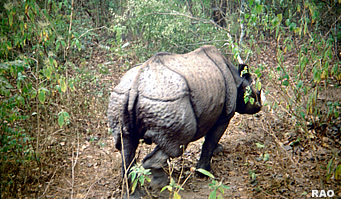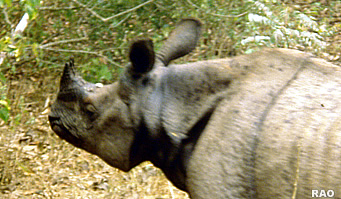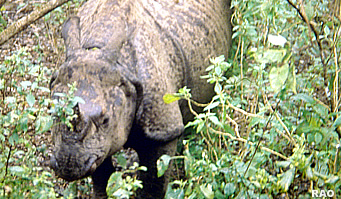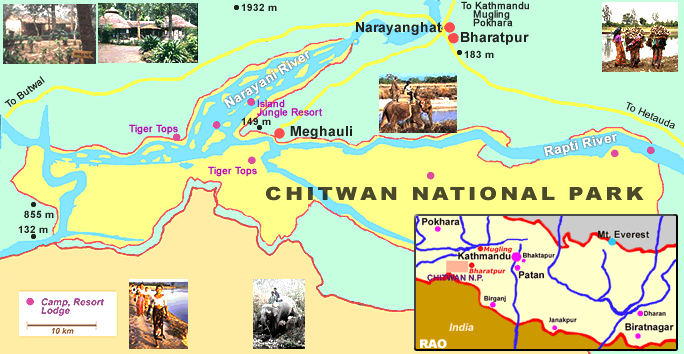 |
2015 |
|
 |
| Nepal achieves 21% increase in rhino numbers |
 |
| May 2015 |
Nepal's rhino population has increased by an encouraging 21% based on the rhino count data released by the Government of Nepal.
There are now presently 645 rhinos as compared to the 2011 estimate of 534 rhinos in Nepal's Terai Arc Landscape.
 |
The rhino count was conducted in Chitwan National Park, Parsa Wildlife Reserve, Bardia National Park, Shuklaphanta Wildlife Reserve and their buffer zones in the Terai Arc Landscape from 11 April-2 May. The count was led by the government's Department of National Parks and Wildlife Conservation and Department of Forests in collaboration with WWF Nepal and National Trust for Nature Conservation.
|
|
"The encouraging results of the rhino count are a boost to Nepal's conservation efforts, even while the country tries to come to terms with the devastating earthquake that shook the nation," stated Tika Ram Adhikari, Director General of the Department of National Parks and Wildlife Conservation. "This achievement follows Nepal's recent success in achieving 365 days of zero poaching of rhinos for a third time within five years, and underscores the commitment of the government, national and international conservation partners and the local communities to work together for a better future of our iconic species."
The count was conducted using a sweep operation by mobilizing 54 elephants and 267 trained observers, which included wildlife biologists, technical staff from national parks and wildlife reserves, National Trust for Nature Conservation and WWF Nepal, together with representatives from the Nepal Army and local communities. The population estimate was based on individual rhino information identifying unique and special characteristics of each rhino such as shape and horn size, folds present on the neck and rump, and body markings. As a pilot, the count also made use of a mobile-based platform developed by the Nepal Army whereby rhino data and images were captured using cell phones on-site and stored at the park headquarters in Chitwan in real-time.
"The encouraging growth in rhino numbers reflects the success of conservation efforts for this species and are a result of improved rhino protection measures and management of habitat," stated Anil Manandhar, Country Representative of WWF Nepal. "This achievement is an example in resilience for a nation that lost 37 rhinos to poaching in a single year in 2002, and an inspiration to continue strengthening efforts in delivering conservation impact."
WWF provided both technical and financial support, through WWF US, WWF UK, Asian Rhino and Elephant Action Strategy (AREAS) and the USAID-funded Hariyo Ban Program, to the government for the rhino count.
| Source: WWF Nepal , May 2015 |
top
| Nepal marks yet another 365 days of Zero Poaching of rhinos |
 |
| May 2015 |
Nepal marked yet another 365 days of Zero Poaching of rhinos for the period ending 2 May 2015. This makes it the third time in a span of five years that the country has been able to repeat this success.
This positive news comes amidst the eighth day since a massive earthquake shook Nepal, and it adds to the stories of hope, courage and resilience as people fight back to rebuild their lives, communities and the country at large.
 |
"Nepal is in transition, for the better," stated Tika Ram Adhikari, Director General of the Department of National Parks and Wildlife Conservation. "For the nation to rise from adversity, we need to work together, just as this encouraging success in conservation has shown as an outcome of collaborative working between the government, enforcement agencies, national and international conservation partners and the local communities.
|
|
The Symposium: Towards Zero Poaching in Asia held in Nepal in February this year also boosted concerted efforts towards zero poaching."
A coordinated response right from the central to the grassroots level, and heightened protection measures within Protected Areas and buffer zone and community forests, including the use of new technologies such as SMART and real-time SMART patrolling are the key contributors towards Nepal achieving the zero poaching success.
"These are trying times for Nepal and its people," stated Anil Manandhar, Country Representative of WWF Nepal. "Stories such as this indeed shine the much-needed ray of hope for people to believe that though the ground may have shaken beneath their feet, they still stand tall, undeterred and driven to build back a country that inspires the world."
During this twelve-month period, more than 650 arrests were made of people involved in wildlife crimes in Chitwan alone, including that of Raj Kumar Praja who was arrested by an Interpol team in Malaysia in January this year. Praja is believed to have poached 20 rhinos in a span of six years until 2010.
Nepal was able to achieve 365 days of zero poaching first in 2011 for rhinos, and for 12 months ending February 2014, for rhinos, tigers and elephants. There are an estimated 534 rhinos in Nepal as the country awaits a fresh estimate from the rhino count that is expected to be announced on 5 May 2015.
| Source: WWF Nepal , May 2015 |
top
| Chitwan
NP: Nepal's notorious rhino poacher arrested |
 |
| February 2015 |
The government of Nepal made public the arrest of a notorious rhino poacher, Raj Kumar Praja, amidst a press event in Chitwan National Park.
Praja, a resident of Chitwan, was arrested by an Interpol team in Malaysia on 30 January based on a Red Corner Notice issued by Interpol at the request of the Nepal Police. He was brought to Nepal on 8 February and has been placed under the custody of Chitwan National Park since 9 February.
Based on preliminary investigations, Praja confessed to poaching 20 rhinos within a span of six years until 2010 in Chitwan. He had also injured five rhinos and was involved in the trade of two rhino horns.
Praja was deported to Nepal by the Malaysian government after he was found to be living their illegally since the last four years under a fake citizenship and the alias of Bhaktaraj Giri.
 |
| Praja was on the run since 2013 after the government slapped a fifteen-year jail sentence on him for wildlife crimes.
The government of Nepal through its enforcement agencies and collaboration with conservation partners such as WWF and the local communities has stepped up efforts against dismantling the network of poachers and wildlife criminals within and outside the protected areas. |
|
Praja's arrest follows the success of Nepal achieving 365 days of zero poaching in 2011 and the period ending February 2014.
"The capture and jailing of Nepal's most wanted poacher shows how serious the government is about tackling wildlife crime and how determined it is to ensure that poaching kingpins, like Raj Kumar Praja, pay for their crimes," said Anil Manandhar, Country Representative of WWF Nepal. "WWF Nepal congratulates the work of the Nepalese and Malaysian governments and INTERPOL, showing that poachers and wildlife traffickers can run but they can't hide. Poaching still remains a threat to Nepal's endangered wildlife, but Praja's arrest is another major step on the road to zero-poaching."
| Source: WWF Nepal , February 2015 |

|
|
Chitwan
National Park
|
|
Links
|
 |
 |
 |
External
link |
| more information |
 |
|








